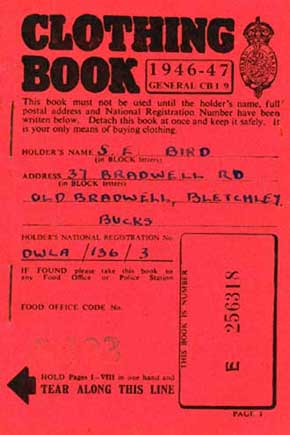 |
|||||||||||
| Rationing/Clothing Coupons
As a war measure, rationing was introduced into Britain during 1941. Every man, woman and child was issued with a ration book to ensure a fair distribution of essential food and clothing items. People who worked on the Railway or on the land were given extra rations. There was a good community spirit in the village and neighbours helped each other. If one family had items they were not keen on, they swapped them for things they liked. As a child, one person remembers dropping a bag of sugar on the ground and being sent to the nearby farm for a spoon to pick up the sugar, so that it could be used. Children in the village did not have sweets, or bananas during the war years. During the war there was a salvage collection in the village (perhaps similar to recycling today). Worn out items were collected and taken to a barn. Everything was collected for the war effort. As children, the villagers remember having great fun looking through the items that were being salvaged and recall "The vicar putting out sets of lovely books". Clothing as well as food was rationed and were always handed down in the family from the oldest child down to the youngest. If you were the youngest in the family, the chances are you would never have brand new clothes. A well known saying was "Make do and mend". The Woman's Voluntary Service based in Wolverton would help with clothes for children. Petrol was also rationed during the war years, but that did not affect many families in the village as very few people had their own transport. |
|||||||||||
 |
|||||||||||
|
|
|||||||||||
|
|
|
||||||||||